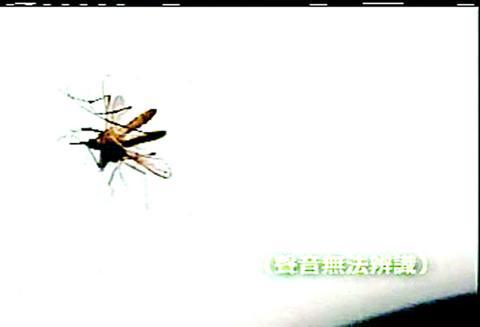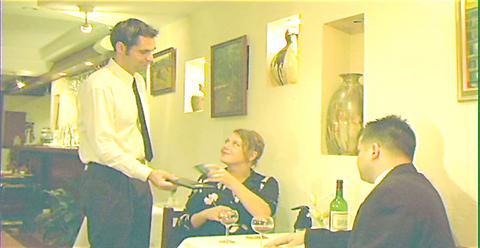For a testament to the presence of underground amateur film talent in Taipei, as well as to the concept that almost anyone can make movies now with a Guanghua-market PC and a cheap handycam, look no further than the Urban Nomad film festival, which starts today and runs through Sunday. The event screens a selection of short films by expat and local filmmakers that, while often extravagantly lo-fi in their production, are a refreshing break from the earnestness of Taipei's other film festivals.
This year, the organizers have tightened up their programming to cut down on the genuinely bad movies that have marred previous Urban Nomads and selected the choice cuts from among the movies submitted. They also solicited films from abroad and at colleges in Taiwan. So, this year's lineup of movies will try to balance the quirkiness of amateur alternative film with some near-professional level films to make the audience feel like their NT$200 wouldn't have been better spent on the latest Hollywood schlock flick.
A sneak preview of a handful of the scheduled movies shows plenty of promise. Tomorrow's digital shorts category will include former Taipei resident Jay Spieden's gory animation Choppy the Chimp and Les Arthur's Street Pong. In this second movie, two ping-pong players wheel their table through the streets of Taiwan to play in some random locations like in front of a Family Mart and eventually end up on a beach with the tide coming to add tension to their dramatic match point. It's not brilliant, but it's fun.

PHOTO COURTESY OF URBAN NOMAD
Norman Szabo's Dignity, which also screens tomorrow in the same category, enjoys some surprisingly good acting from local expats, as does TC Lin's spy thriller Clay Soldiers. Lin's film was submitted to the ladyxfilms.com film project that collects amateur spy flicks from around the world, and, in keeping with the genre's tradition, there are mysterious and ravishing ladies, a secret disc and a high-speed chase with bullets flying.
In tonight's program, two of the films previewed that are worth cheking out are The Locust, which is basically a music video for the LA band by the same name, and The Varieties of Romantic Experience, a short by Northwestern University film student Dan Freed shot with professional actors.
The highlight of the festival will be Sunday's screening of Aza Jakob's feature film Nobody Needs to Know, which has a synopsis on the film's own Web site that is entirely incomprehensible, but suggests a theme that explores the notion of the camera -- both the closed-circuit and the film kind -- as a tool of control. Part of the festival's program will be a free workshop tomorrow at Huashan Arts District by Ulead software company to tutor amateur filmmakers in its editing software.

PHOTO COURTESY OF URBAN NOMAD

PHOTO COURTESY OF URBAN NOMAD

Taiwan has next to no political engagement in Myanmar, either with the ruling military junta nor the dozens of armed groups who’ve in the last five years taken over around two-thirds of the nation’s territory in a sprawling, patchwork civil war. But early last month, the leader of one relatively minor Burmese revolutionary faction, General Nerdah Bomya, who is also an alleged war criminal, made a low key visit to Taipei, where he met with a member of President William Lai’s (賴清德) staff, a retired Taiwanese military official and several academics. “I feel like Taiwan is a good example of

March 2 to March 8 Gunfire rang out along the shore of the frontline island of Lieyu (烈嶼) on a foggy afternoon on March 7, 1987. By the time it was over, about 20 unarmed Vietnamese refugees — men, women, elderly and children — were dead. They were hastily buried, followed by decades of silence. Months later, opposition politicians and journalists tried to uncover what had happened, but conflicting accounts only deepened the confusion. One version suggested that government troops had mistakenly killed their own operatives attempting to return home from Vietnam. The military maintained that the

Before the last section of the round-the-island railway was electrified, one old blue train still chugged back and forth between Pingtung County’s Fangliao (枋寮) and Taitung (台東) stations once a day. It was so slow, was so hot (it had no air conditioning) and covered such a short distance, that the low fare still failed to attract many riders. This relic of the past was finally retired when the South Link Line was fully electrified on Dec. 23, 2020. A wave of nostalgia surrounded the termination of the Ordinary Train service, as these train carriages had been in use for decades

Lori Sepich smoked for years and sometimes skipped taking her blood pressure medicine. But she never thought she’d have a heart attack. The possibility “just wasn’t registering with me,” said the 64-year-old from Memphis, Tennessee, who suffered two of them 13 years apart. She’s far from alone. More than 60 million women in the US live with cardiovascular disease, which includes heart disease as well as stroke, heart failure and atrial fibrillation. And despite the myth that heart attacks mostly strike men, women are vulnerable too. Overall in the US, 1 in 5 women dies of cardiovascular disease each year, 37,000 of them